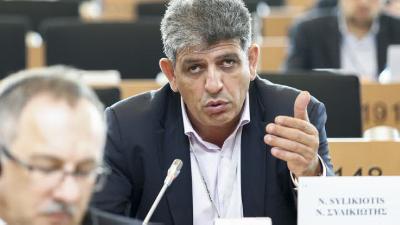
The government fireworks and energy reality
Article by Neoklis Sylikiotis, member of AKEL Political Bureau
26th September 2016
 It’s said over and over again that the government has concluded important energy agreements of historical significance. However in reality it is continuing its amateur and shoddy improvisations and proceeding to agreements without tangible results. In addition, it has mostly advertised the third round of licensing and the interest shown by large companies, which is a positive development. However, what purpose does this serve when, while we have contracts with powerful companies such as ENI and TOTAL since 2013, the government allows companies to suspend their obligations and is renewing contracts without these companies fulfilling their contractual obligations? We are therefore talking about pompous announcements without any substantive actions whatsoever.
It’s said over and over again that the government has concluded important energy agreements of historical significance. However in reality it is continuing its amateur and shoddy improvisations and proceeding to agreements without tangible results. In addition, it has mostly advertised the third round of licensing and the interest shown by large companies, which is a positive development. However, what purpose does this serve when, while we have contracts with powerful companies such as ENI and TOTAL since 2013, the government allows companies to suspend their obligations and is renewing contracts without these companies fulfilling their contractual obligations? We are therefore talking about pompous announcements without any substantive actions whatsoever.
Unfortunately, the government canceled the comprehensive energy planning that existed during the previous government and as a result negative fait accompli have been created to our detriment. Due to the inactiveness displayed by the government, we missed the opportunity to create a terminal LNG liquefaction plant at Vassiliko.
Furthermore, the options we had for the utilization of Cypriot natural gas, in cooperation with neighboring countries, were cancelled. The only option left was Egypt, which, as the Government itself admits, presents problems and difficulties. It’s enough to consider that Egypt has progressed to carrying out its own projects and by 2020 it will produce large amounts of natural gas covering its needs.
Subsequently, the government delayed almost two years to declare the “Aphrodite” deposits as viable and now there is a serious danger, if companies do not manage to reduce the cost of developing and exploiting natural gas that we won’t proceed to extraction.
Therefore no specific plan exists for when natural gas will be extracted, nor to where it will be sold. In addition, while in 2013 as a result of the Troika’s intervention the government rejected and voted against a bill that was submitted in the House of Representatives to establish a Hydrocarbons Fund, today the government is tabling a new bill that has no relation whatsoever to the Norwegian model. This is the reality behind the government’s communication games – and it’s not only that.
The policies being promoted at an EU level for the creation of an Energy Union, make the goal of exploiting the natural gas for the benefit of the Cypriot people even more difficult.
A recent example is the European Commission’s proposal with regards intergovernmental agreements. According to this proposal EU Member States will no longer have the possibility to sign intergovernmental agreements with third countries without the approval of the European Commission. Furthermore, control is demanded even as far as non-binding acts is concerned, such as the Memoranda of Understandings, the Ministerial joint declarations and joint actions for energy supply or for the development of energy infrastructures.
These proposals transform the states into pawns, fully dependent on the European Commission as each of their actions now require the Commission’s approval. These developments do not receive the appropriate attention by the government, which continues to applaud and vote for policies promoting the creation of the EU’s Energy Union.
Equally serious is the government’s inertia also with regards the promotion of the prospects being created by the natural gas reserves in the Exclusive Economic Zone (EEZ) of the Republic of Cyprus. In the proposals tabled by the European Commission for the EU’s energy strategy there is no substantial reference to the reserves of the Eastern Mediterranean. Even in the proposal submitted recently concerning the EU Strategy for liquefied natural gas there is no reference whatsoever to the need to utilize the important role that Cyprus’ domestic sources can play. In addition, there is no reference to the benefits that can come from the creation of a terminal LNG liquefaction plant in Cyprus, which should exploit the reserves of the wider region too. We are struggling to add these references into the reports of the European Parliament. However, that is not enough.
Developments get ahead us. The Government must undertake initiatives to prevent the energy policies promoted in the EU do the detriment of Cyprus’ sovereign rights. It must strengthen the struggle we are waging in the European Parliament for the EU to turn its attention to the reserves of the Eastern Mediterranean by rendering practical support to Cyprus in the exploitation of reserves.
The most important thing however is to act with determination and consistency for the development and implementation of a comprehensive scheme for transforming Cyprus into an energy hub. Only this will we safeguard the rights of Cyprus and the Cypriot people.




